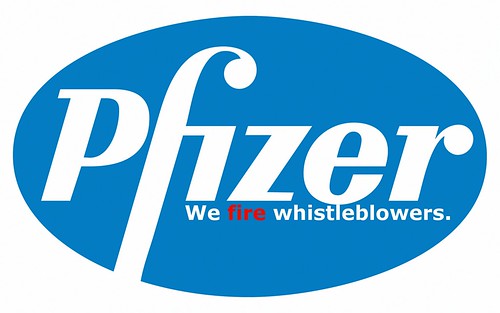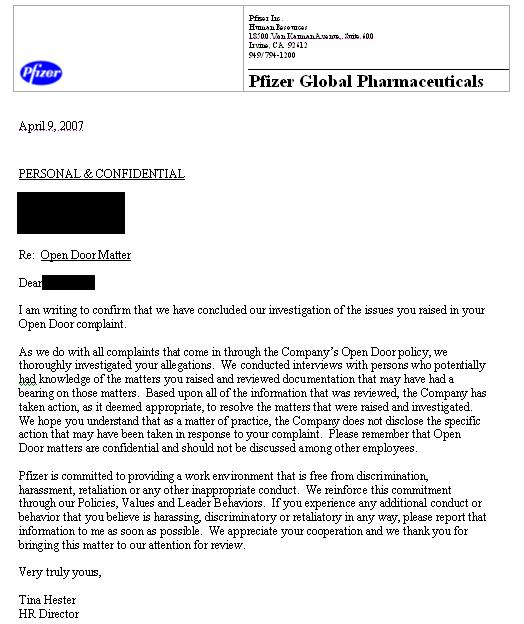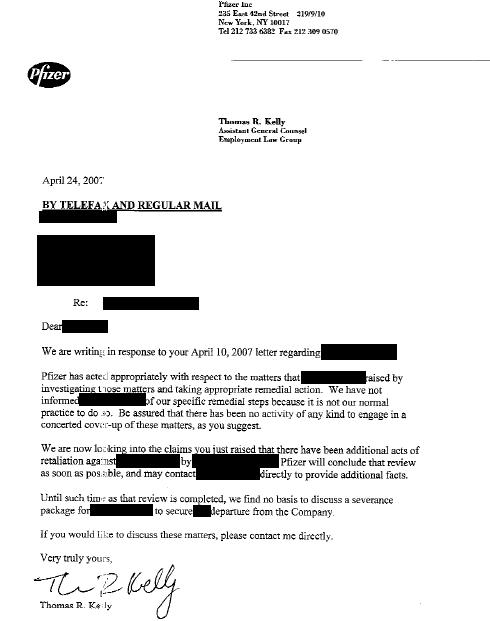
Several sources inside Pfizer have informed Question Authority that Pfizer has caught "Jane Roe," the maraviroc whistleblower.
"Once you posted the redacted e-mails it was easy," one source commented. (You can read those e-mails
here.)
"Our security people searched millions of e-mails, looking for date and time and certain phrases. We had Jane Roe identified within hours of your article."
"We triangulated her name, and a few days later shut down her e-mail access," another source claims.
According to the second source, last week Jane and some of her colleagues were hauled in front of Pfizer's lawyer from Ropes & Gray, an associate or paralegal from Ropes & Gray, and an in-house Pfizer lawyer and and were interrogated for several hours.
"We left her knowing exactly what we know about her. Now she's is 'marinading.' That's the word we use to break someone. We leave them in limbo until the pressure makes them voluntarily resign, or they have a breakdown."
Apparently, Pfizer had reams and reams of documents and analysis to force Jane Roe to confess that she was the recipient or had written the e-mails that were posted on Question Authority.
Unfortunately for Pfizer, that doesn't prove that Jane is the one who actually forwarded them to me. And there was no other way for Pfizer to find out other than to ask Jane:
After showing all the proof they had, Joshua Levy from Ropes & Gray allegedly confronted Jane asking, "who's been sending material to Rost's site?"
Jane responded, "well it could be anyone, there are many disgruntled employees"
Levy allegedly then said "who? who?"
Jane responded, "maybe it is a composite of people."
Levy said "you still haven't answered me" and Jane responded, "I really can't say for sure. If you have any other questions send them to me."
Levy had one stack with postings from Question Authority, and how those posts corresponded to Jane's emails, a second stack of documents with various unapproved slide presentations, pdf-documents, and clinical studies on maraviroc and Viracept, and a meeting list with times and dates and names of physicians who had been approached.
My source claims they even brought testimony from other reps from around the country, and also from Dennis Pontani, Medical Affairs, Art Rodriquez, Sales Director, and Kelly Fitzgeralds, formerly Assistant Sales director and now District Manager for Boston.
The key objective in this situation (based on my personal experience with Pfizer), is for Pfizer lawyers to try to shoot as many holes as possible in the whistleblower story, and to build a defense against the allegations rather than dig for the truth.
Based on what I've been told, this meeting was no different.
The format was basically to ask questions that were aimed at disputing that any maraviroc pre-marketing meetings ever took place with physicians, or that if they were, that they didn't rise to the level of illegal promotion.
Unfortunately for Pfizer's lawyers, I hear they came back exasperated, since Jane Roe, without notes or anything, gave them the full story, the same way she's told it to me.
One person claimed, "If you hadn't made this public with all those documents, the company could have disavowed knowledge of the exsistence of any of these meetings."
Another HIV sales sales rep who was interrogated claims Joshua S. Levy from Ropes & Gray let it slip that others in sales management were disputing they had any knowledge of any of the allegations by Jane Roe.
Since there are only 43 reps in Pfizer's HIV sales force, it begs the question, if this assertion is true, shouldn't they have known this, and if they didn't know, why not? Have they had a sales force going crazy behind their backs? Or were they just not up to the job of supervising their employees? Or is this a truthful statement in the first place?
Levy was, as expected, not forthcoming with any information at all but it was clear Pfizer sees a problem and wants it fixed.
Among the most explosive allegations made at these meetings with Joshua Levy was that "in a conference call we were were told to delete all maraviroc info off our computers."
Levy allegedly disputed this saying "didn't they say to put it in a folder?"
The reps responded, "no they told us to do that with all the unapproved materials they have been asking us to use."
As expected, a number of Pfizer HIV sales reps are now corresponding with each other about the interrogations they've gone through and speculation is rampant what will happen to sales management in the HIV area.
As for Pfizer, they are sitting tight and have not yet fired Jane Roe.
"We expect FDA approval for maraviroc by June 20 and we'll be launching this baby in July. Until then, everyone has been ordered not to rock the boat."
So, perhaps, Jane Roe is safe in her job for another month.
As for Pfizer, clearly they have a very different approach to whistleblowers than AstraZeneca, who never started a witch hunt.
The whistleblowers at AstraZeneca stated, "We see that the company is making an effort to clean up their act and want to give them a chance to do so. To their credit, there has been no 'witch hunt' to discover our identities or retaliate against us."
Unfortunately, that is not a claim Pfizer can make.

[Identifying information in this article has been changed and certain quotes modified to maintain confidentiality of sources. For legal disclaimer
go here. And read all about the maraviroc scandal
here.]

 And the guy who conducts the investigation is Joshua S. Levy.
And the guy who conducts the investigation is Joshua S. Levy.














